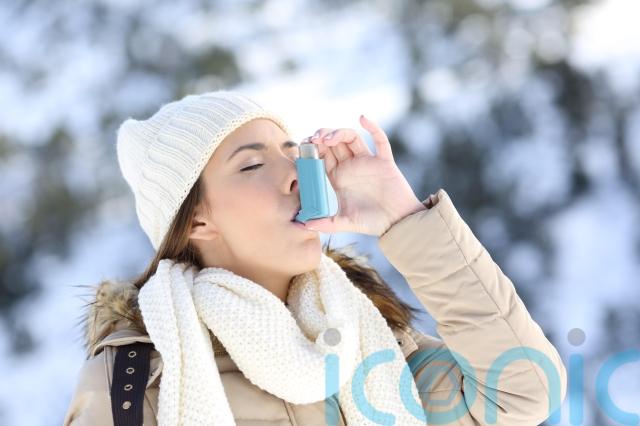
It’s common to feel a sensation of breathlessness or difficulty “catching your breath” in cold weather, but it’s important to know when this escalates into something more serious.
Over the past two years alone, there has been a 23% increase in emergency hospital admissions for respiratory conditions – such as asthma or chronic obstructive pulmonary disease (COPD), according to Asthma and Lung UK.
Between April 2024 and March 2025 there were 2,268,865 emergency hospital admissions for respiratory conditions in England, compared to 1,841,010 between April 2022 and March 2023, a rise of 427,855.
These figures stress the importance of being clued up about the warning signs of a respiratory emergency, so we spoke to Dr Andy Whittamore, GP and clinical lead at Asthma + Lung UK, to find out what red flags to look out for…
What are some key signs that might indicate your breathing requires immediate medical attention?
1. Severe breathlessness
“If you are severely breathless, or if it’s come on very, very quickly so you can’t complete full sentences, that can be a particular sign you are having more of a life-threatening attack on your breathing,” highlights Whittamore.
2. Tight or painful chest

“If you are either get a very tight or painful chest, that sort of discomfort could be a sign of an asthma attack, or an infection like pneumonia, or even a heart problem,” notes Whittamore.
3. Blue lips, tongue or fingertips
“If your lips, tongue or fingertips go blue, which is what we call cyanosis, that’s a sign of very low oxygen,” highlights Whittamore. “If you also experience breathlessness with that, then that’s an emergency which requires immediate intervention.”
4. Fast or noisy breathing
“If you are getting wheezing and that comes on very quickly or your breathing just sounds very noisy or very fast, then that can be a sign you are really struggling with your breathing,” says Whittamore.
5. Confused, tired or dizzy

“If you are confused or tired or dizzy as well as breathless, that’s a sign that your body is really struggling to get oxygen to where it’s needed,” says Whittamore.
What should you do if you start experiencing these symptoms?
“One of the hardest but most important things to do is to try and stay calm,” says Whittamore. “When somebody is panicking or anxious, their breathing becomes abnormal, so panicking can actually make your breathlessness worse. Try to stop, sit upright and stay as calm as possible.
“Then if you have a reliever inhaler, take that and follow your asthma and COPD action plan, if you have one, as it will tell you on there what to do in this situation.”
After that, if your symptoms are severe or are getting worse, seek urgent medical help.
“Always call an ambulance if it’s very severe or if you are really struggling,” advises the GP. “You can always cancel an ambulance, but you can never get an ambulance when it’s too late.”
What could the consequences of waiting and not seeking medical help be?
“A lot of these things can be life-threatening, so really important to seek medical advice as soon as possible,” says Whittamore. “In addition, some causes of breathlessness are harder to treat the longer they’ve been in place. ”
Struggling to breathe can also put strain on the rest of the body.
“If the brain and heart aren’t getting enough oxygen or are working even harder, it can actually cause heart complications like heart attacks,” says Whittamore. “So, it’s really important to get immediate help because if people aren’t getting their oxygen, it can cause damage to tissues, including the lungs and the heart.”
Are respiratory emergencies more common in the winter?
“People with underlying lung conditions can struggle at any time during the year, but in winter we see a lot more people in the GP surgery, in A&E departments and actually admitted to hospital as well,” says Whittamore. “That’s because there’s so many more triggers that set off the lungs in winter. There’s more viruses and infections going around that can cause minor issues, which can rapidly turn into more severe problems.”
Regularly take your inhaler

“If you have got an underlying lung condition like asthma or COPD, take your preventer inhalers regularly,” advises Whittamore. “Carry your reliever inhaler with you all the time because you never know when one of the triggers is going to catch you out.”
Keep up to date with all your winter vaccines
“Check to see if you are eligible for the flu, Covid, RSV [respiratory syncytial virus] and pneumococcal vaccinations,” recommends Whittamore. “They won’t necessarily stop everybody getting these conditions, but if you were to catch one of them you would react less severely and would be more likely to stay well during the winter.”
Stay warm

“Keep the heating on when you can and if you’re going out, make sure you’re well wrapped up warm to try and keep the cold out,” says Whittamore.
Ensure your house is well ventilated
“Make sure that you’re not letting your house get damp,” advises Whittamore. “Make sure you’re ventilating the house every so often to prevent damp and get rid of any moisture from things like cooking or drying clothes.”
Flag any noticeable breathing changes to a GP
“If your asthma or COPD isn’t behaving as it normally does, or even if you are getting breathlessness for the first time and it’s not too bad, seek help before it gets worse as these things are much easier to treat early on,” says Whittamore.
For more information on protecting your lung health this winter, visit asthmaandlung.org.uk/withyouthiswinter
Subscribe or register today to discover more from DonegalLive.ie
Buy the e-paper of the Donegal Democrat, Donegal People's Press, Donegal Post and Inish Times here for instant access to Donegal's premier news titles.
Keep up with the latest news from Donegal with our daily newsletter featuring the most important stories of the day delivered to your inbox every evening at 5pm.